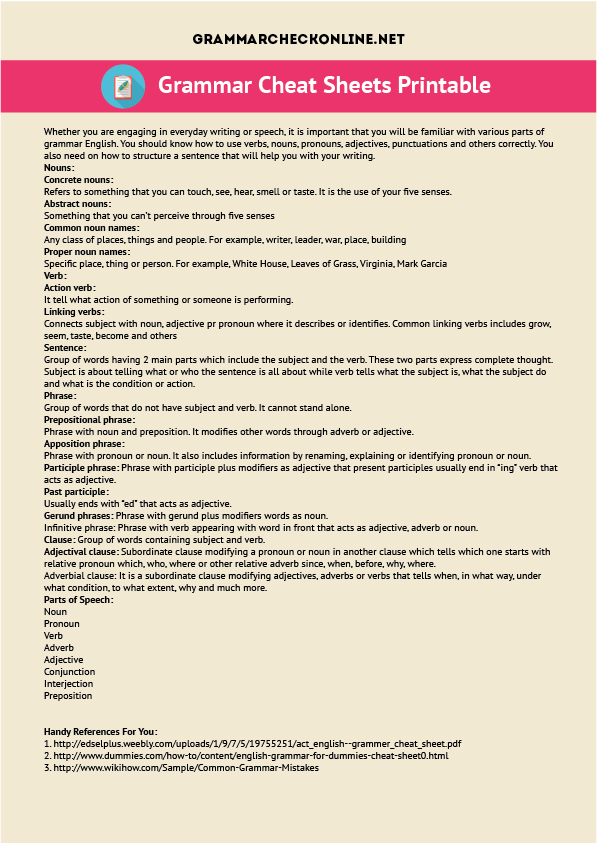Basic Grammar Rules Cheat Sheet
Posted By admin On 01.01.19English is the world’s international language, but that doesn’t mean it’s the world’s easiest language. It’s full of grammar oddities, confusing vocabulary and hard-to-master conventions. There are nearly twice number of people speaking English as second language as there are native speakers, and the ability to speak and write English has become an essential skill for anyone serious about an international career.

Those whose English is flawless will impress easily, and those who make errors risk coming across as careless. It pays to master English grammar, even if you’re a native English speaker. All it takes is a little attention to detail, and the ability to remember how to get around a few of the language’s quirks. If you want to improve your English, focus on: • Banishing grammar mistakes Make sure you know when to use a comma, what an apostrophe’s for and how to make your writing simple and clear. • Swotting up on confusing words English includes plenty of words that have similar spellings, but different meanings, such as affect and effect. It’s difficult to know which to use in any given sentence, so spend some time learning some common problem words.
French Grammar Rules Cheat Sheet
Grammar and Writing Rules Cheat Sheet: Life Skills Practice (Writing) Can't find what you're looking for? Scholastic Teachables—worksheets, lesson plans, learning games, and more! Dec 16, 2015 - The Ultimate English Grammar Cheat Sheet For Students. The English language can be a confusing beast, full of inconsistent rules.
• Widening your vocabulary It’s easy to keep on using the same few words you’re comfortable with, but you’ll communicate far better if you take advantage of the rich variety of the English language. • Proofreading Everyone makes mistakes, no matter how fluent they are. The only way to make sure you don’t, is to proofread your work (and then proofread it again). Check out our infographic below for more on how to improve your English. When you have a story to tell, and you need to express it in the best way, the last thing you want is to allow grammar errors to get in the way of your writing. Fear not, The Expert Editor’s ultimate grammar cheat sheet will help you navigate through common grammar mistakes. From dangling modifiers to the dreadful vague pronoun references that can have readers wanting to strangle you, rest assured that this delightfully portable grammar sheet will have you covered.
English Basic Grammar Rules
Grammar Errors Bad grammar makes you look unprofessional. Avoid the most grammar mistakes by being vigilant of these errors: When a word or phrase modifies a word, but it is not clear which particular word is being modified, or whether there is such a word being modified at all, then you have a dangling modifier on your hands. Because the modifier does not have a specified target, it is “dangling”. Comma splices are easy to fix.
When you have two independent clauses and you find a comma in between them, simply select a semi-colon or a period instead. Sentence fragments are a bunch of words huddled together to impersonate a sentence, but a sentence they do not make.
A sentence requires at least one independent clause. An independent clause is a clause which contains both a subject and a verb, and is independent in that it can function on its own. Get rid of unnecessary commas because they can interrupt the flow of your sentence if they are simply littered about mindlessly.
Make sure that you are clear on which subject your pronoun is referring to. When a pronoun can refer to more than one subject, or the subject is only implied, then you have yourself a vague pronoun reference. If there is a chance that you can be misunderstood, then change this! Apostrophes are there for contractions. “It’s” is the contracted equivalent of “it is”, while “its” is a possessive pronoun. Confusing Words Often Misused Alot is not a word. Do not put “alot” when you mean “a lot”, which is two words.